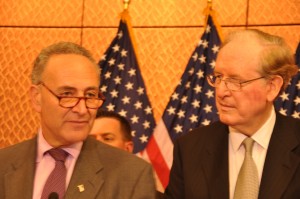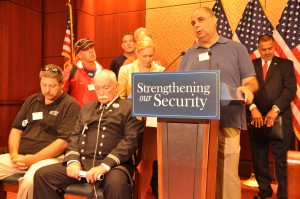
Senators Schumer (left) and Rockefeller at the Capitol to promote the public safety network bill (Bob Spoerl/MNS)
WASHINGTON–A bipartisan coalition of U.S. politicians urged that the auction of wireless spectrum be used to, in part, fund a public safety wireless network for first responders, which has been stalled since the days following the Sept. 11 terrorist attacks.
U.S. Sen. Charles Schumer, D. N.Y., said Wednesday at the U.S. Capitol that the plan would save lives and make emergency response more efficient without costing taxpayers money.
“To get this kind of help for our first responders without it costing the taxpayers a dime is a great accomplishment,” Schumer said.
“The 9/11 Commission Report,” released in 2004, called for a public safety communication network. First responders had difficulty communicating in the chaos after the attacks, chiefly because various departments were on different radios and networks.
Some telecommunications companies have spectrum they don’t use. Part of the bill would establish a means to persuade broadcasters and companies to return spectrum to the government. The Federal Communications Commission would have an “incentive auction” selling extra spectrum. Proceeds from that auction would go toward creating the public safety network.
The network is expected to cost $12 billion to set up. U.S. Sen. Kirsten Gillibrand, D- N.Y., said the auction would generate tens of billions of dollars of revenue, which would more than offset the start-up costs.
New York police and firefighters traveled to Washington to urge Congress to pass the legislation before the 10th anniversary of the 9/11 attacks.
Advocate John Feal of the FealGoodFoundation, a nonprofit lobbying for healthcare of 9/11 first responders, demonstrated what it would symbolize if Congress failed to pass the communication bill. At the press event Wednesday, he dramatically tore pages out of a copy of “The 9/11 Commission Report.”
“It means nothing if you’re not going to listen to the recommendations it made to save lives,” Feal said.
Schumer and Gillibrand touted the bill at a Capitol Hill news conference along with U.S. Sen. John Rockefeller, D-W.Va. U.S. Rep. Peter King, R-N.Y., had said he supports the bill and was scheduled to attend but was delayed by a vote on the House floor.
Part of the bill reserves a spectrum known as the “D Block” for public safety, which would establish a nationwide broadband network to be used solely by emergency workers. Two million public safety employees would use the network.
“Put simply, communication devices are a lifeline for our emergency workers,” Schumer said.
Gillibrand said a nationwide network would create a more efficient first responder. Firefighters could use high-speed broadband to download floor plans of burning buildings and emergency medical technicians could access patient health records in the ambulance, she said.
Because broadband is so widely used, responders may have trouble connecting or getting fast service.
Lawmakers who support the bill aren’t sure when it will get a full hearing, though. Congress is considering raising the nation’s debt ceiling, to the exclusion of almost all other legislation.
“We’ll get to the bill as soon as we can,” Gillibrand said.

